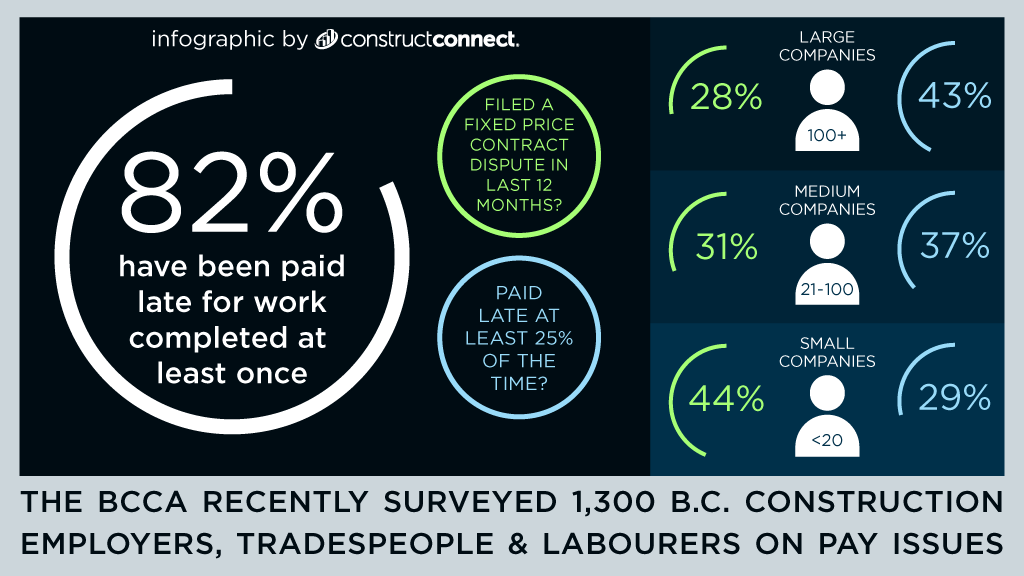It seems without regulation late payment in British Columbia’s construction sector has become the norm as the industry grapples with multiple factors that continue to cause strain.
According to the British Columbia Construction Association’s (BCCA) annual survey, 82 per cent of contractors said they’re company received late payment at least once in the past year.
The survey had 1,300 respondents. Forty-seven per cent were employers of various sizes and 44 per cent were tradespeople or labourers.
The survey’s response highlights the desperate need for the introduction of prompt payment in the province, said BCCA president Chris Atchison, who also highlighted this issue in a recent Construction Record podcast.
“Until B.C. catches up to the rest of Canada, the USA and Britain, and introduces prompt payment legislation, policy-makers need to be tuned into the fact that the financial risks for B.C.’s contractors are nearing a breaking point,” Atchison said.
A spokesperson for B.C.’s Ministry of the Attorney General said consultations on how the province could introduce prompt payment are set to begin this year.
“We are aware of requests from within the construction and skilled trades community for prompt payment legislation in B.C. and are meeting with other jurisdictions through the Prompt Payment Working Group to learn best practices and monitor the impacts of prompt payment legislation,” the spokesperson told the Journal of Commerce.
But there isn’t a one-size-fits-all solution.
“Broader consultation is needed to determine how legislation would work best in B.C. to ensure usage and effectiveness,” said the spokesperson.
“The ministry anticipates beginning engagement with industry partners later this year. To help inform these engagements, industry associates are encouraged to consult with their members on how prompt payment legislation in B.C. could be structured and submit their detailed proposals to the Ministry of the Attorney General.”
The survey also revealed 34 per cent of contractors are paid late more than 25 per cent of the time and that 35 per cent have entered a fixed contract dispute in the past 12 months.
One unnamed respondent wrote their company does $5 to $6 million per year in sales and regularly has more than $400,000 in outstanding pay, which is “crippling for growth.”
Despite the range of issues contractors face regarding payment, the introduction of prompt payment was ranked as the number two concern in the province. The number one concern was a shortage of skilled labour.
Data collected by the BCCA show the number of trade workers in the province has declined by nine per cent over the past three years.
“There are many retirements and we’re fighting hard to find new talent. But the labour shortage is acutely felt beyond the crew, and that impacts costs and timelines too,” Atchison said.
“The whole ecosystem is pressed for experienced staff, from the design team to the authorities having jurisdiction and the owners themselves. Contractors are deciding not to take on projects due to risk in the process as well as crew shortages.”
There has also been a decrease in the number of tradeswomen in the province, down two per cent in the past three years to 4.5 per cent of 163,900 skilled tradespeople.
Women have also shown a declining enthusiasm regarding staying in the sector. In 2019, 59 per cent of female respondents to the BCCA’s survey said they expected to still be working in construction in the next three years. The most recent survey shows that number drop to 44 per cent.
Since 2021, the number of workers who recommend construction as a career has dropped 200 per cent, according to the survey.
Another concern of survey respondents was public procurement policy. Some respondents said contracts tend to favour the owner during public procurement, that larger companies are more favoured for jobs and that the same companies tend to win all the bids.
Only 45 per cent of large contractors saying they’re “very likely” to bid, versus less than 20 per cent of small contractors.
But it’s not all doom and gloom, with 52 per cent of workers saying they received higher hourly pay this year and that 44 per cent switched employers thanks to a pay raise.
The industry in B.C. is contributing 9.7 per cent of the province’s GDP at $25 billion per year, up four per cent from last year and is the number one employer in the goods sector.
The industry has also grown 17 per cent employee-wise in the past year leaving it six per cent above pre-pandemic levels, though the skilled trades workforce has decreased by nine per cent of pre-pandemic levels.
In addition to the survey, the BCCA also released its spring 2023 stat pack. See industry and workforce trends here.











Recent Comments